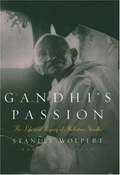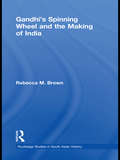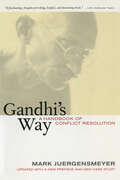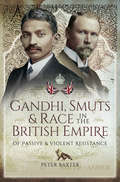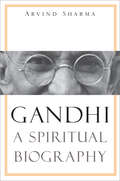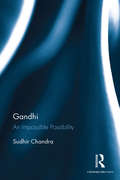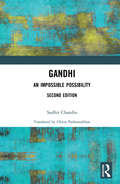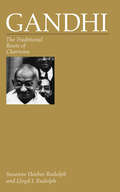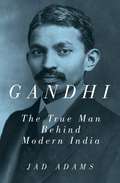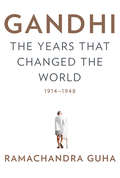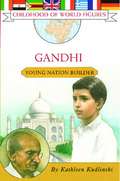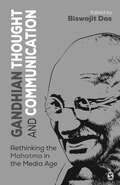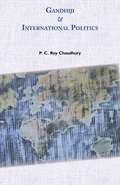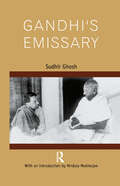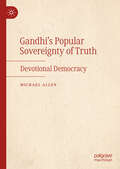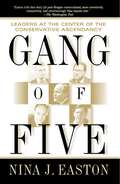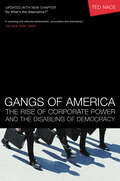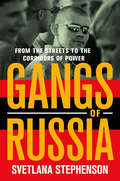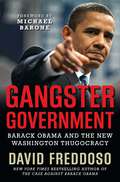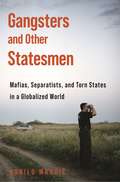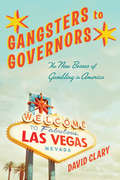- Table View
- List View
Gandhi's Passion: The Life and Legacy of Mahatma Gandhi
by Stanley WolpertMahatma Gandhi, through his indomitable will and selfless determination, transformed himself into a model of courage and integrity for India's people to emulate in their nonviolent struggle for political power. More than half a century after his death, Gandhi continues to inspire millions throughout the world. Yet modern India seems to have abandoned much of his nonviolent vision, joining the nuclear arms race. Inspired by recent events in India, Stanley Wolpert offers this subtle and profound biography of India's "Great Soul". Wolpert compellingly chronicles the life of Mahatma Gandhi from his early days as a child of privilege to his humble rise to power and his assassination at the hands of a man of his own faith. This trajectory, like that of Christ, was the result of Gandhi's passion: his conscious courting of suffering as the means of reaching divine truth. From his early campaigns to end discrimination in South Africa to his leadership of a people's revolution to end the British imperial domination of India, Gandhi emerges as a man of inner conflicts conquered by his political genius and moral vision. The sweet reasonableness of his "Great Soul", combined with the steel of his unyielding opposition to intolerance and oppression, would inspire India like no leader since the Buddha -- creating a legacy that would encourage Martin Luther King, Jr., Nelson Mandela, and other global leaders to demand a better world through peaceful civil disobedience.
Gandhi's Spinning Wheel and the Making of India (Routledge Studies in South Asian History)
by Rebecca BrownGandhi’s use of the spinning wheel was one of the most significant unifying elements of the nationalist movement in India. Spinning was seen as an economic and political activity that could bring together the diverse population of South Asia, and allow the formerly elite nationalist movement to connect to the broader Indian population. This book looks at the politics of spinning both as a visual symbol and as a symbolic practice. It traces the genealogy of spinning from its early colonial manifestations in Company painting to its appropriation by the anti-colonial movement. This complex of visual imagery and performative ritual had the potential to overcome labour, gender, and religious divisions and thereby produce an accessible and effective symbol for the Gandhian anti-colonial movement. By thoroughly examining all aspects of this symbol’s deployment, this book unpacks the politics of the spinning wheel and provides a model for the analysis of political symbols elsewhere. It also probes the successes of India’s particular anti-colonial movement, making an invaluable contribution to studies in social and cultural history, as well as South Asian Studies.
Gandhi's Way: A Handbook of Conflict Resolution
by Mark JuergensmeyerGandhi’s Way provides a primer of Mahatma Gandhi’s principles of moral action and conflict resolution and offers a straightforward, step-by-step approach that can be used in any conflict—-at home or in business; in local, national, or international arenas. This invaluable handbook, updated with a new preface and a new case study on terrorism in Northern Ireland, sets out Gandhi’s basic methods and illustrates them with practical examples. Juergensmeyer shows how parties at odds can rise above a narrow view of self-interest to find resolutions that are satisfying and beneficial to all involved. He then pits Gandhi’s ideas against those of other great social thinkers in a series of imaginary debates that challenge and clarify Gandhi’s thinking on issues of violence, anger, and love. He also provides a Gandhian critique of Gandhi himself and offers viable solutions to some of the gaps in Gandhian theory. Gandhi’s Way: A Handbook of Conflict Resolution was previously published as Fighting with Gandhi and Fighting Fair.
Gandhi, Smuts & Race in the British Empire: Of Passive & Violent Resistance
by Peter BaxterTowards the end of 1906, a meeting took place between two emerging giants of the age, Mohandas K. Gandhi and General Jan Christian Smuts. United under the same empire, but separated by distance and culture, Smuts was born in the Cape Colony, and Gandhi in Porbandar, a duchy of the Indian province of Gujarat. Both, however, went on to study law in Britain, and while developing a great admiration for the institutions of empire, each man also suffered his own particular crisis of faith. From their widely dispersed origins, Gandhi and Smuts collided over the issue of race and equality in a turbulent province of the empire, each attempting to hold the British to their stated ideals. This insightful book explores attitudes to race, and belonging, in an age when the English speaking peoples straddled the globe, and sought to impose on all of their subject races, basking under the radiance of Britannia, a common ideal of parity, equal opportunity and free movement.
Gandhi: 'Hind Swaraj' and Other Writings
by Anthony J. ParelHind Swaraj is Mahatma Gandhi's fundamental work. Not only is it key to understanding his life and thoughts, but also the politics of South Asia in the first half of the twentieth century. Celebrating 100 years since Hind Swaraj was first published in a newspaper, this centenary edition includes a new preface and editor's introduction, as well as a new chapter on 'Gandhi and the 'Canonical aims of life''. The volume presents a critical edition of the 1910 text of Hind Swaraj, fully annotated and including Gandhi's own Preface and Foreword (not found in other editions). Anthony J. Parel sets the work in its historical and political contexts and analyses the significance of Gandhi's experiences in England and South Africa. The second part of the volume contains some of Gandhi's other writings, including his correspondence with Tolstoy and Nehru.
Gandhi: A Spiritual Biography
by Arvind SharmaIn his Autobiography, Gandhi wrote, "What I want to achieve--what I have been striving and pining to achieve these thirty years--is self-realization, to see God face to face. . . . All that I do by way of speaking and writing, and all my ventures in the political field, are directed to this same end." While hundreds of biographies and histories have been written about Gandhi (1869-1948), nearly all of them have focused on the political, social, or familial dimensions of his life. Very few, in recounting how Gandhi led his country to political freedom, have viewed his struggle primarily as a search for spiritual liberation.Shifting the focus to the understudied subject of Gandhi's spiritual life, Arvind Sharma retells the story of Gandhi's life through this lens. Illuminating unsuspected dimensions of Gandhi's inner world and uncovering their surprising connections with his outward actions, Sharma explores the eclectic religious atmosphere in which Gandhi was raised, his belief in reincarnation, his conviction that morality and religion are synonymous, his attitudes toward tyranny and freedom, and, perhaps most important, the mysterious source of his power to establish new norms of human conduct. This book enlarges our understanding of one of history's most profoundly influential figures, a man whose trust in the power of the soul helped liberate millions.
Gandhi: An Impossible Possibility
by Sudhir ChandraFor a man who made such a powerful intervention in the history of the 20th century, many of Mahatma Gandhi’s ideas were misunderstood or obfuscated during his lifetime. This book draws our attention to Gandhi’s last years, particularly the marked change in his understanding of the acceptance of non-violence by Indians. It points to a startling discovery Gandhi made in the years preceding India’s Independence and Partition: the struggle for freedom which he had all along believed to be non-violent was in fact not so. He realised that there was a causal relationship between the path of illusory ahimsa which had held sway during the freedom struggle and the violence that erupted thereafter during Partition. Calling for a serious rethink on the very nature and foundation of modern India, this book throws new light on Gandhian philosophy and its far-reaching implications for the world today. It will interest not only scholars and researchers of modern Indian history, politics, and philosophy but also lay readers.
Gandhi: An Impossible Possibility
by Sudhir ChandraGandhi was perhaps the most influential yet misunderstood figure of the twentieth century. Drawing close attention to his last years, this book explores the marked change in his understanding of the acceptance of non-violence by Indians. It points to a startling discovery Gandhi made in the years preceding India’s Independence and Partition: the struggle for freedom which he had all along believed to be non-violent was in fact not so. He realised that there was a causal relationship between the path of illusory ahimsa, which had held sway during the freedom struggle, and the violence that erupted thereafter during Partition. In the second edition of this much-acclaimed volume, Chandra revisits Gandhi’s philosophy to explain how and why the phenomenon of the Mahatma has been understood and misunderstood through the years. Calling for a rethink of the very nature and foundation of modern India, this book throws new light on Gandhian philosophy and its far-reaching implications for the world today. It will interest not only scholars and researchers of modern Indian history, politics and philosophy, but also lay readers.
Gandhi: The Traditional Roots of Charisma
by Susanne Hoeber Rudolph Lloyd I. RudolphThe Rudolphs' analysis reveals that Gandhi's charisma was deeply rooted in the aspects of Indian tradition that he interpreted for his time. They key to his political influence was his ability to realize in both his daily life and his public actions, cultural ideals that many Indians honored but could not enact themselves—ideals such as the traditional Hindu belief that a person's capacity for self-control enhances his capacity to control his environment. Appealing to shared expectations and recognitions, Gandhi was able to revitalize tradition while simultaneously breaking with some of its entrenched values, practices, and interests. One result was a self-critical, ethical, and inclusive nationalist movement that eventually led to independence.
Gandhi: The True Man Behind Modern India
by Jad Adams"Provocative. Adams strips away Gandhi's saintly aura and explores the duality of India's most famous leader."--Financial Times Jad Adams traces the course of Gandhi's multi-faceted life and the development of his religious, political, and social thinking over seven tumultuous decades: from his comfortable upbringing in a princely state in Gujarat; his early civil rights campaigns; his leadership through civil disobedience in the 1920s and 1930s that made him a world icon; and finally to his assassination by a Hindu extremist in 1948, only months after the birth of an independent India. An elegant and masterly account of one of the seminal figures of twentieth-century history, Adams presents for the first time the true story behind the man whose life may truly be said to have changed the world.
Gandhi: The Years That Changed The World, 1914-1948
by Ramachandra GuhaAn epic and revelatory biography of one of the most abidingly influential--and controversial--men in modern history.Opening with Gandhi's triumphant return to India in 1915 after decades abroad, and ending with his tragic assassination in 1949, Gandhi: The Years that Changed the World is a remarkable, moving portrait that provides a crucial re-evaluation of India's iconic leader for a new generation. <p><p> Drawing on a wealth of newly uncovered materials unavailable to previous biographers, acclaimed historian and author Ramachandra Guha brings the past to life with extraordinary grace and clarity. Deploying his gifts as a storyteller and scholar, Guha presents Gandhi as both a fascinating human being--a man of fierce hope, eccentric personal beliefs, and sometimes dark and alarming contradictions--as well as a dynamic political force and global icon. <p> Sharp, insightful, balanced, and impeccably researched, this free-standing sequel to Guha's magisterial biography Gandhi Before India is an indispensable resource for a contemporary understanding of Gandhi's ever-evolving legacy.
Gandhi: Young Nation Builder
by Kathleen KudlinskiA childhood biography of the great political and social leader.Mohandas K. Gandhi (1869-1948) studied law in England, then spent 20 years defending the rights of immigrants in South Africa. In 1914 he returned to India and became the leader of the Indian National Congress. Gandhi urged non-violence and civil disobedience as a means to independence from Great Britain, with public acts of defiance that landed him in jail several times. In 1947 he participated in the postwar negotiations that led to Indian independence. He was shot to death by a Hindu fanatic in 1948. This childhood biography highlights the events that informed Gandhi's indomitable spirit.
Gandhian Thought and Communication: Rethinking the Mahatma in the Media Age
by Biswajit DasGandhian Thought and Communication: Rethinking the Mahatma in the Media Age looks at Gandhian thought and contributions from an interdisciplinary communication perspective. It explores the Mahatma as a public intellectual and communicator. It studies Gandhi’s unique communication techniques to connect with the masses and the way he used and appropriated myth, metaphors and symbols to communicate his ideas related to modernity and nationalism. The book examines how Gandhian ideas have been tested and the implications derived. This book also studies the contemporary relevance of Gandhian thought by looking at various popular media representations to open up the possibilities of rethinking and recasting Gandhi in the present context.
Gandhiji and International Politics
by P. C. Roy ChaudhuryGandhiji never lived and died for the freedom of India alone. He had observed: “Through realization of freedom of India I hope to realize and carry on the mission of the brotherhood of man.” With him not to believe in the possibility of international peace was to disbelieve in the godliness of human nature. Truly Gandhiji was the universal man—the man who stands out as the landmark and his value as the universal man will go on increasing through the passage of time. Gandhiji is dead but Gandhism shall survive the lashes of time and changes in the material world.
Gandhi’s Emissary
by Sudhir GhoshIn 1946, at the age of 29, the author was chosen by Mahatma Gandhi to act as unofficial emissary between the British Labour Government and India in the delicate negotiations which resulted in the country’s independence. His unique position enabled him to give the world a moving and informed account of the principal actors in the drama that led to the division of India and Pakistan and the creation of a parliamentary democracy in India. With the resurgence of interest and debate on Partition in India and Pakistan, and around the world, in the context of current international groupings, it is fitting that this book be brought back into circulation.
Gandhi’s Popular Sovereignty of Truth: Devotional Democracy
by Michael AllenThis book offers a philosophical reconstruction of Gandhi&’s political thought as a form of devotional democracy in which the sovereign people speak the voice of truth as God&’s voice. Part One addresses Gandhi&’s relationship to the history of modern Western political thought, and key thinkers such as Hobbes, Locke, and Hegel. Part Two explores the concept of a Gandhian devotional democracy in relation to contemporary political thought and decidedly illiberal thinkers, such as Ivan Ilyin and Curtis Yarvin, as well as contemporary trends including populism, traditionalism, along with important developments like AI superintelligence and interspecies politics. The book aims not only to locate Gandhi in the historical context of modern and contemporary political philosophy but to also demonstrate the potential for his political thought to undergo sympathetic and constructive reinterpretation. It encourages readers to reassess and rethink the role of &‘soul force&’ as superior to state power as well as a nation&’s capacity to realize truth devotionally. Gandhi&’s Popular Sovereignty of Truth is essential reading for all scholars, researchers and advanced students of political philosophy especially those focussing on the thought of Mahatma Gandhi.
Gang of Five: Leaders at the Center of the Conservative Crusade
by Nina J. EastonIn Gang of Five, bestselling author Nina J. Easton adds an important element to the history of American politics in the last thirty years. This is the story of the other, less well known segment of the baby-boom generation. These are young conservative activists who arrived on campus in the 1970s in rebellion against everything "sixties" and went on to overturn the political dynamics of the country in the 1980s and 1990s. They've been waging what Newt Gingrich called a "war without blood" for three decades. Gang of Five portrays the intertwining careers of five major figures: BILL KRISTOL, the Harvard-educated elitist and publisher of the Weekly Standard, is the liberal establishment's worst nightmare -- a witty, erudite Rightist who was a leading force behind the demise of the Clinton health care plan, the historic reform of welfare, and the decision of House Republicans to impeach the president. RALPH REED, the hardball politico who helped turn an organization called the College Republicans into a kind of communist cell of the Right, in the 1990s tried to give the Religious Right a softer face as leader of the Christian Coalition but was thwarted by his thirst for power and the narrow fundamentalism of his activist followers. CLINT BOLICK, a leading force in the spread of school choice programs and the anti-affirmative action strategist who sank Lani Guinier's appointment, is the idealist who seeks to convince civil rights leaders that his legal work on behalf of disadvantaged minorities is sincere and that liberal programs hurt the people they are meant to help. GROVER NORQUIST, the "market Leninist" who divides the world into "good" and "evil," is at the hub of Hillary Clinton's "vast right-wing conspiracy" and is the architect of a no-new-taxes pledge signed by all major Republican candidates in the 1990s. DAVID MCINTOSH, the policy wonk who took the movement's war on Washington to Congress as leader of the House Republican freshmen during the Gingrich Revolution, pushed his party toward confrontation with the White House and is now running for governor in Indiana. In contrast to earlier generations of conservatives, these leaders and their allies tasted success, first with Ronald Reagan's twin victories in the 1980s and then, in the 1990s, with the Republican capture of Congress. They play to win and have had a hand in every major insurrection from the Right over the past two decades -- from abortion politics to government shutdowns to political muckracking. No politician can ignore their agenda or escape the new hardball rules they've written for national politics.
Gangs of America: The Rise of Corporate Power and the Disabling of Democracy
by Ted NaceThe corporation has become the core institution of the modern world. Designed to seek profit and power, it has pursued both with endless tenacity, steadily bending the framework of law and even challenging the sovereign status of the state. Where did the corporation come from? How did it get so much power? What is its ultimate trajectory? After he sold his successful computer book publishing business to a large corporation, Ted Nace felt increasingly driven to find answers to these questions. In Gangs of America he details the rise of corporate power in America through a series of fascinating stories, each organized around a different facet of the central question: "How did corporations get more rights than people?" Beginning with the origin of the corporation in medieval Great Britain, Nace traces both the events that shaped the evolution of corporate power and the colorful personalities who played major roles. Gangs of America is a uniquely accessible synthesis of the latest scholarly research, a compelling historical narrative, and a distinctive personal voice.
Gangs of Russia: From the Streets to the Corridors of Power
by Svetlana StephensonSince their spectacular rise in the 1990s, Russian gangs have remained entrenched in many parts of the country. Some gang members have perished in gang wars or ended up behind prison bars, while others have made spectacular careers off the streets and joined the Russian elite. But the rank and file of gangs remain substantially incorporated into their communities and society as a whole, with bonds and identities that bridge the worlds of illegal enterprise and legal respectability.In Gangs of Russia, Svetlana Stephenson explores the secretive world of the gangs. Using in-depth interviews with gang members, law enforcers, and residents in the city of Kazan, together with analyses of historical and sociological accounts from across Russia, she presents the history of gangs both before and after the arrival of market capitalism.Contrary to predominant notions of gangs as collections of maladjusted delinquents or illegal enterprises, Stephenson argues, Russian gangs should be seen as traditional, close-knit male groups with deep links to their communities. Stephenson shows that gangs have long been intricately involved with the police and other state structures in configurations that are both personal and economic. She also explains how the cultural orientations typical of gangs--emphasis on loyalty to one's own, showing toughness to outsiders, exacting revenge for perceived affronts and challenges--are not only found on the streets but are also present in the top echelons of today's Russian state.
Gangs, Pseudo-Militaries, and Other Modern Mercenaries: New Dynamics in Uncomfortable Wars (International and Security Affairs Series #6)
by Max G. Manwaring Edwin G. Corr John T. Fishel<p>As the first decade of the twenty-first century has made brutally clear, the very definitions of war and the enemy have changed almost beyond recognition. Threats to security are now as likely to come from armed propagandists, popular militias, or mercenary organizations as they are from conventional armies backed by nation-states. In this timely book, national security expert Max G. Manwaring explores a little-understood actor on the stage of irregular warfare—the gang. <p>Since the end of the Cold War, some one hundred insurgencies or irregular wars have erupted throughout the world. Gangs have figured prominently in more than half of those conflicts, yet these and other nonstate actors have received little focused attention from scholars or analysts. This book fills that void. <p>Employing a case study approach, and believing that shadows from the past often portend the future, Manwaring begins with a careful consideration of the writings of V. I. Lenin. He then scrutinizes the Piqueteros in Argentina, gangs in Colombia, private armies in Mexico, Hugo Chavez's use of popular militias in Venezuela, and the looming threat of Al Qaeda in Western Europe. <p>As conventional warfare is increasingly eclipsed by these irregular and “uncomfortable” wars, Manwaring boldly diagnoses the problem and recommends solutions that policymakers should heed.</p>
Gangster Government: Barack Obama and the New Washington Thugocracy
by David Freddoso"GANGSTER GOVERNMENT" Columnist Michael Barone invented the phrase.President Obama has perfected the practice.And in this new and stunning book, New York Times best-selling author David Freddoso (The Case Against Barack Obama) provides the much-needed exposé of an administration that has brought Chicago-style corruption and strong-arm politics to Washington, looking to reward its friends (the unions, federal workers, and other liberal interest groups) and punish its enemies (the private sector workers and taxpayers who foot the bill for Obama¹s massive expansion of the federal government).In Gangster Government you'll learn, among other shocking revelations:How the Obama administration has used "czars" and "recess appointments" to install powerful bureaucrats, some with extreme views and shady pasts, without congressional oversightHow the Obama administration ignored the Constitution and reversed 100 years of bankruptcy law to reward its friends (the United Autoworkers) in the GM and Chrysler bailoutWhy even the pretense of "cutting costs" in Obamacare came second to rewarding the Democrat-supporting trial lawyers' lobbyWhy, ignoring federal law, the Obama administration is trying to shield the TSA workers who search passengers at airports from private sector competitionHow the trillion dollar "stimulus" was directed overwhelmingly at protecting government workers supported by the taxpayersWhy "green jobs" are all about shaking down the taxpayer for favored businesses-not about truly "sustainable" energy or jobsHow the Obama administration bullies private businesses and even state governments that don't cooperate with gangster governmentGangster Government is a devastating and revealing look at the momentous first two years of the Obama administration and its subversion of our Constitution and laws. It casts a hard look at a president whose training on Chicago's political playground shines through every bent law and every broken promise.
Gangster Warlords: Drug Dollars, Killing Fields, and the New Politics of Latin America
by Ioan GrilloA new kind of criminal kingpin has arisen: part CEO, part terrorist, and part rock star, unleashing guerrilla attacks, strong-arming governments, and taking over much of the world's trade in narcotics, guns, and humans. What they do affects you now--from the gas in your car, to the gold in your jewelry, to the tens of thousands of Latin Americans calling for refugee status in the U.S. Gangster Warlords is the first definitive account of the crime wars now wracking Central and South America and the Caribbean, regions largely abandoned by the U.S. after the Cold War. Author of the critically acclaimed El Narco, Ioan Grillo has covered Latin America since 2001 and gained access to every level of the cartel chain of command in what he calls the new battlefields of the Americas. Moving between militia-controlled ghettos and the halls of top policy-makers, Grillo provides a disturbing new understanding of a war that has spiraled out of control--one that people across the political spectrum need to confront now.
Gangsters and Other Statesmen: Mafias, Separatists, and Torn States in a Globalized World
by Danilo MandićHow global organized crime shapes the politics of borders in modern conflictsSeparatism has been on the rise across the world since the end of the Cold War, dividing countries through political strife, ethnic conflict, and civil war, and redrawing the political map. Gangsters and Other Statesmen examines the role transnational mafias play in the success and failure of separatist movements, challenging conventional wisdom about the interrelation of organized crime with peacebuilding, nationalism, and state making.Danilo Mandić conducted fieldwork in the disputed territories of Kosovo and South Ossetia, talking to mobsters, separatists, and policymakers in war zones and along major smuggling routes. In this timely and provocative book, he demonstrates how globalized mafias shape the politics of borders in torn states, shedding critical light on an autonomous nonstate actor that has been largely sidelined by considerations of geopolitics, state-centered agency, and ethnonationalism. Blending extensive archival sleuthing and original ethnographic data with insights from sociology and other disciplines, Mandić argues that organized crime can be a fateful determinant of state capacity, separatist success, and ethnic conflict.Putting mafias at the center of global processes of separatism and territorial consolidation, Gangsters and Other Statesmen raises vital questions and urges reconsideration of a host of separatist cases in West Africa, the Middle East, and East Europe.
Gangsters to Governors: The New Bosses of Gambling in America
by David ClaryGenerations ago, gambling in America was an illicit activity, dominated by gangsters like Benny Binion and Bugsy Siegel. Today, forty-eight out of fifty states permit some form of legal gambling, and America’s governors sit at the head of the gaming table. But have states become addicted to the revenue gambling can bring? And does the potential of increased revenue lead them to place risky bets on new casinos, lotteries, and online games? In Gangsters to Governors, journalist David Clary investigates the pros and cons of the shift toward state-run gambling. Unearthing the sordid history of America’s gaming underground, he demonstrates the problems with prohibiting gambling while revealing how today’s governors, all competing for a piece of the action, promise their citizens payouts that are rarely delivered. Clary introduces us to a rogue’s gallery of colorful characters, from John “Old Smoke” Morrissey, the Irish-born gangster who built Saratoga into a gambling haven in the nineteenth century, to Sheldon Adelson, the billionaire casino magnate who has furiously lobbied against online betting. By exploring the controversial histories of legal and illegal gambling in America, he offers a fresh perspective on current controversies, including bans on sports and online betting. Entertaining and thought-provoking, Gangsters to Governors considers the past, present, and future of our gambling nation. Author's website (http://www.davidclaryauthor.com)
Ganztagsbildung: Kooperation von Jugendhilfe und Schule? (Soziale Arbeit als Wohlfahrtsproduktion #26)
by Karin Böllert Oliver Bokelmann Jana DemskiDer Band stellt aktuelle Diskurse zu Ganztagsbildung mit Blick auf die Kooperation von Jugendhilfe und Schule dar und gibt Impulse zur theoretischen und empirischen Vergewisserung kooperativer Praxis. In den Blick genommen werden das Zusammenwirken verschiedener Bildungsinstitutionen und Akteur*innen, unterschiedliche Bildungsverständnisse sowie differente Erwartungen an Ganztagsbildung. Die Beiträge beschäftigen sich sowohl mit etablierten Formen der Zusammenarbeit über das Handlungsfeld Schulsozialarbeit, Ganztagsbetreuung und Jugendsozialarbeit, als auch mit neuen Perspektiven und Entwicklungen, u. a. im Hinblick auf Fragen von Kinderschutz, Beratung, Bildungslandschaften oder Demokratiebildung. Der Rechtsanspruch auf Ganztagsbetreuung im Grundschulalter ab 2026 unterstreicht die Aktualität der behandelten Thematik.
